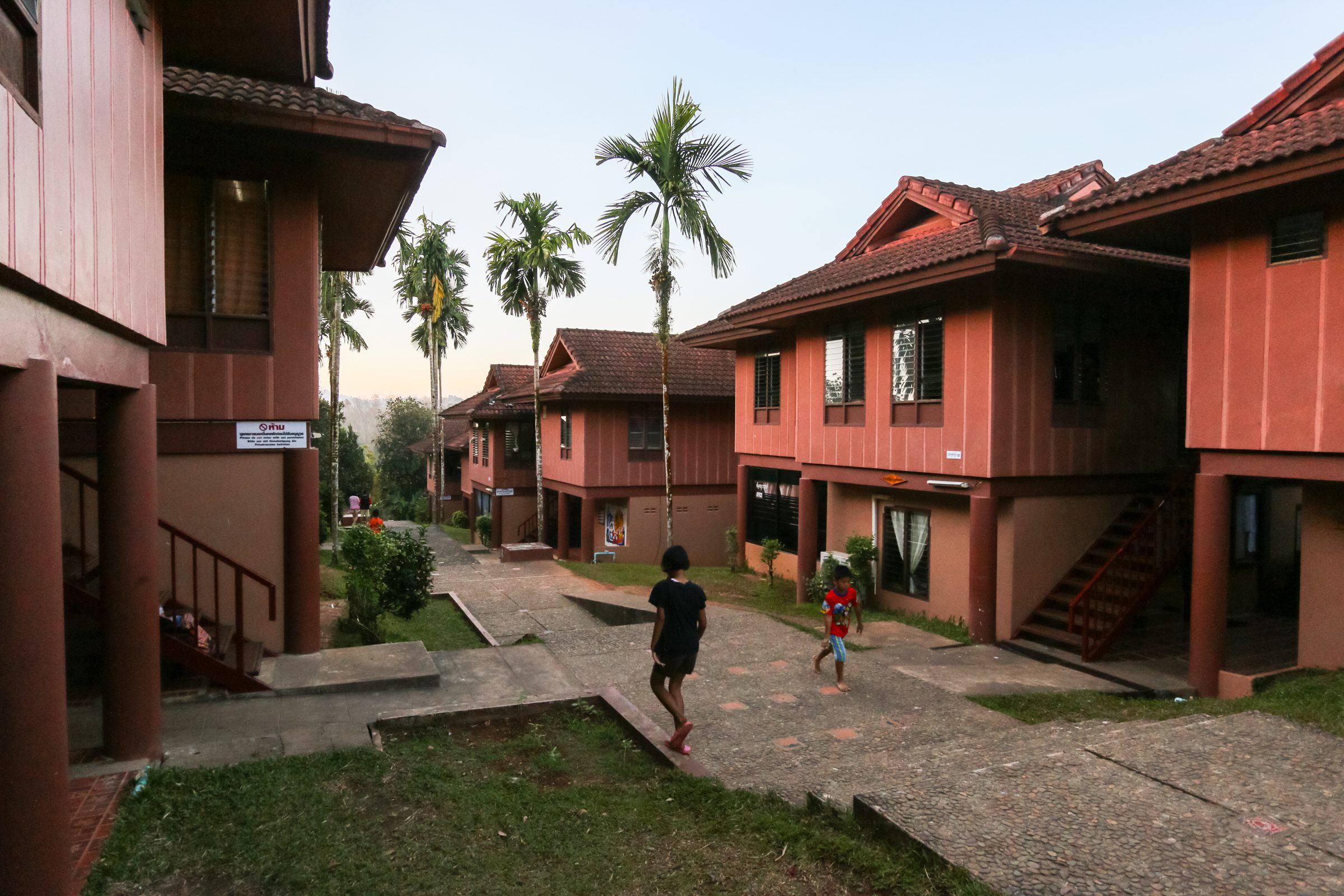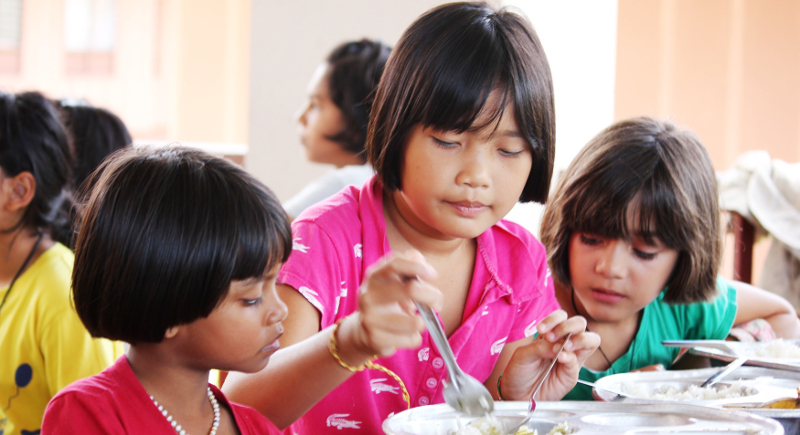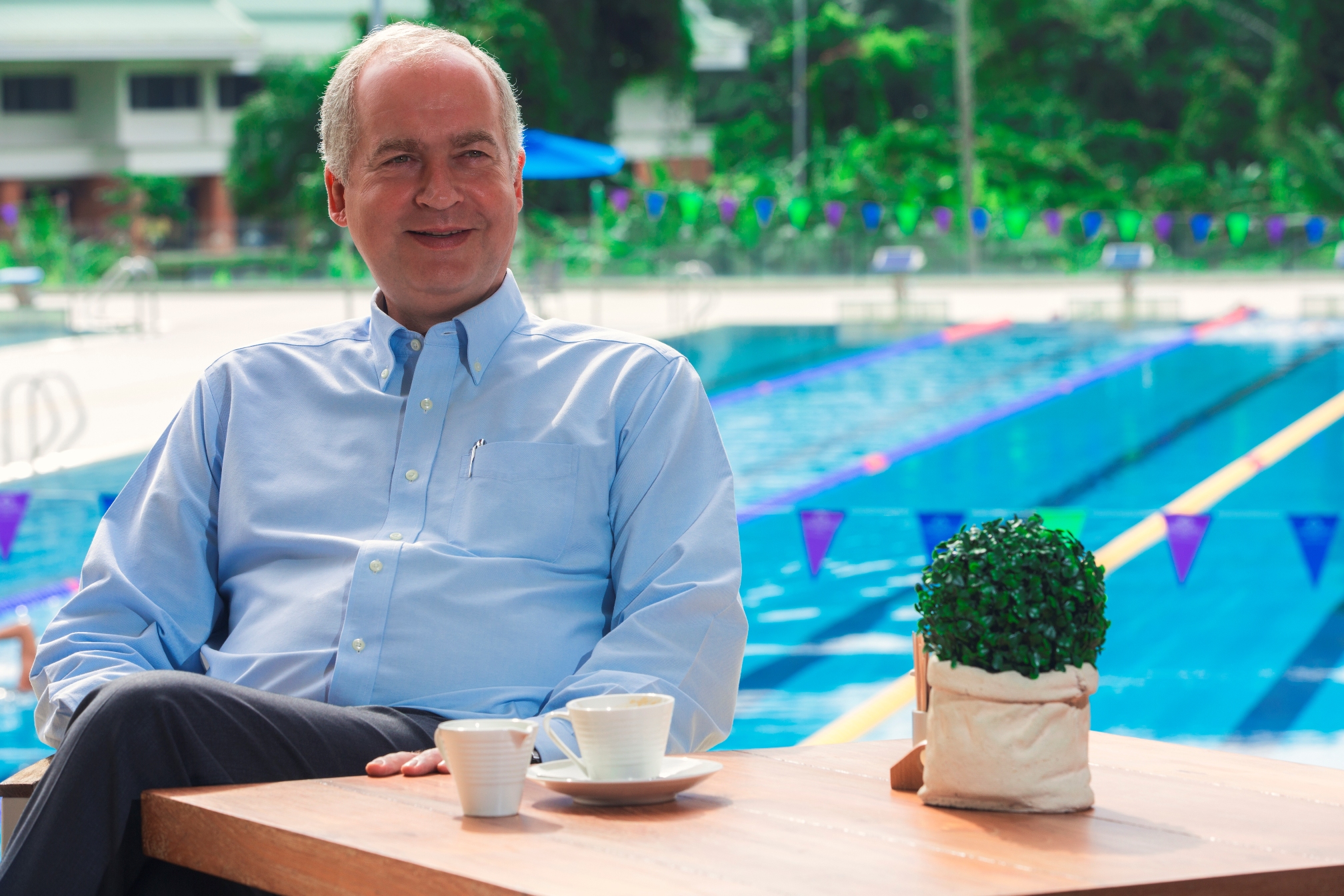Phuket News, September 2014
Phuket educator shares vision for Phang Nga’s World Academy
PHANG NGA: When the waves of the 2004 Boxing Day Tsunami finally subsided on that fateful, unforgettable Sunday, a different kind of wave soon followed course.
Pouring onto the battered and ever-vulnerable shores of Aceh, Sri Lanka, India, and especially right here in Thailand, this wave – one of love and humanity – brought with it millions in volunteer hours, and billions in charitable donations for disaster relief assistance and aid to reinforce and rebuild affected communities throughout the Asian subcontinent.
Nearly a decade on, many of those foundations and organizations have since faded, if not failed. One of the more successful initiatives, that continues to bear fruit today, is Yaowawit School, a unique boarding-school in Phang Nga that was built for not only tsunami-affected students, but for extreme poverty-stricken youth from throughout Southern Thailand.
Nestled in the lush hills just outside of the sleepy Kapong district center, about half-an-hour’s drive inland from Ta Kua Pa, Yaowawit is much more than a school – it’s a life-skills learning centre, eco farm and hospitality training centre, and not to mention as an educational and professional development centre in the making.

And it’s a self-sustainable community model complete with its own deep-well water pump and filtration system with sufficient, clean water flowing year round, on top of boasting its own 300 kilowatt solar farm that drastically reduces its dependence on unstable grid energy. Built through the Children’s World Academy Foundation, the centre is the initiative and vision of renowned German hotelier, educator and philanthropist, Philipp Graf von Hardenberg.
Philipp, who was recently appointed as President and CEO of Phuket’s Thanyapura, invited The Phuket News to visit Yaowawit. The boarding school itself houses and feeds some 120 students, aged 4-17 and some of the region’s “poorest of the poor”. In addition to receiving a worldly Thai, English and German founded education, the youth and parent residents also actively participate in the operation of the on-site “Lodge” hotel and hospitality training centre, and tend to the eco-farm complete with herbs, produce, poultry as well as palm oil and lemmongrass plantations. Here, the Phuket News sat down with Philipp for a heart to heart to learn about the school and his philosophy and vision.

What does Yaowawit mean?
When we started all this, under the Children’s World Academy Foundations (one registered in Germany the other in Phang Nga) HRH Princess Sirindhon was involved from the early stages. She had visited the site with me and I asked her to help us to find a Thai name. Two days later, she sent me an SMS, saying the school should be called “Yaowawit”, the meaning of which reflects the name of the foundation “Children World’s Academy”. We’re very grateful to Her Royal Highness for gifting us the name.
How much was the initial investment – what are your operation expenses?
Yaowawit has been an ongoing process, I like to see it as an education movement, not a static project. We started with five buildings and added more and more as we could afford and per our needs. Now we have more than 20 buildings and for all the building and furnishing, we spent about 2.5 million Euros so far (about 100 million baht). The annual running costs are about 300,000 Euros for 120 children.
The reason why it’s so high is because we are running a school, a boarding house for all the children, an agriculture and a hospitality learning centre, we are still in the process of building up all our education and social business programs. For example, just this year, we invested about 25,000 Euros into the farm – mostly for the ditches, check dams and irrigation. Then because of the hotel, we invested a lot more money than you would in a normal school. For the school itself, the construction cost was about 5 per cent more than it would be to build any normal government Thai school. We know this because after the tsunami, many government schools had to be rebuilt and were partly built using international donations – some of the same benefactors contributed to our project, so we could compare the cost – which every baht/penny needs to be accounted for. Still, even for only being 5 per cent more than ordinary Thai schools, we are building with a boarding and living space for many kids, and not to mention a theatre too.
As a private school, we have received some assistance from the government for the past six years, but it’s not enough to even cover a third of our teachers’ salaries. Governments don’t like to support private schools – it’s like this in most of the world. Even though private schools save the government by taking kids out of the state school system, they don’t return what they had saved. Most of the money to run Yaowawit, therefore, comes via CWA foundations, from sponsors and our partners.
Now coming onto 10 years since the tsunami. Most projects started after the tsunami are now dead … gone. The reason why is those projects could not sustain due to expenses. People tend to donate for hard costs – stones, construction materials, wood, furniture,and so forth, but not so much for soft costs. But it is these soft costs, these ongoing costs which keep a place going. What keeps a school going is managers, teachers, the food, medical and school equipment.
That said, we encourage people and companies to donate directly to the school, if not just for helping us, the children and society, but that charitable donations are tax deductible by as much as 200 per cent.. We have various sponsorship programmes, starting with child sponsorships … This is popular type of sponsorship world wide. On a regular basis, you get pictures, letters, and here sponsors can even visit their child.
The enterprises – farm and hotel – will also help to help sustain the ongoing costs.
How has your hotel and business background transferred over to education?
I’ve been a business manager and entrepreneur all my life. I started working with schools and boarding schools about 15 years ago, initially in Germany, serving on the advisory boards of several German schools.
What I learned very fast was, that with any kind of operation in which you offer services, you have to run it like a business. If you don’t run it like a business, you’re bound to make the same mistakes that many organizations do, that is run it to the point in which it cannot sustain itself, stand on its own two feet. Many small foundations and NGOs that started here after the tsunami made this mistake and they no longer exist as a result.
I apply my entire knowledge of how to run a business into the schools, whether PIA (at Thanyapura) or here at Yaowawit.

So what we do is we have to have a very straightforward and clear business planning, and we have to have a very clear and structured human resources programme. Teachers and all other employees of a school need to understand exactly what you expect. Otherwise, you’ll have many one-man shows, which is not complimentary to achieving the overall school goals and mission. I never get involved in the day to day teaching, in what teachers do in the classrooms, but as a member of the executive team we talk about everything around it – the mission, the practice of teaching and learning, how to operate and manage a school, how to communicate with your school community, scholarships, and so forth.
And then comes sales and marketing, a very important part because what good is it if you have all the best teachers with an empty school? In PIA, our marketing is coming along quite well, we’ve enrolled more than 90 new students in the past three months, mainly because we’ve changed our strategies a little bit. My experiences in the past have taught me, a school is like a business, our business is educational services, and everything around it, school education, lifeskills education and so forth.
And now we have to work with all of our associates and partners on how best to implement all these ideas, which can sometimes be difficult. A school is a little bit like a restaurant in that everyone thinks they can run a restaurant. We’ve all served guests at home, cooked for them, served them wine or beer, and so we think we can run a restaurant because it’s similar, but that’s why many restaurants go broke. Similarly with education, some parents think they understand something about education and teaching because they were in school themselves and they look after kids at home. So some parents think that being a teacher is easy. But it’s not so easy because you have so many kids to care for, and it’s easy for parents to forget how difficult it is to take care of just two or three of their own children. All people are different and have their individual needs and preferences, all 20 children in a classroom too.
So it’s a process, like in any other business, of convincing your key customers to be proud of the product you are offering … Listening to them, but not necessarily giving in to all of their whims, because you can’t please everyone all the time, and you would be foolish, as a school, as a business in trying to. Most businesses concentrate all their efforts and concentration on 10 per cent of the customers, who are unhappy, instead on the 90 per cent who are happy
Can you tell us about your “learning centred” philosophy?
One of the biggest mistakes we are making in education all over the world is for teachers thinking that they can make their students learn, they learn that in university. They don’t understand that the learning process is happening individually by each person. So if I can’t make you learn the question is what can I do to help you to be successful? I need to work like a coach. I need to inspire, empower, motivate, reassure and sometimes praise and correct you. These are all things that I as a teacher can do to motivate and guide you to learn.
Teachers usually think they can make you learn, they are the experts in math, science, English or whatever, that they can transfer their knowledge from their brains into the children’s, but then get frustrated if the students don’t do what they want them to do. Often, because the students do not regard the subjects as meaningful. That’s why learning is not very motivating for many students. They sit up to eight times a day for 45 minutes intervals in too small rooms and have to accept the moods of their teachers who tell them what, how and when to do things. Ask parents, how long they would stay in a job with such conditions?
We as humans function through success. We don’t function through failure. Our Maker has installed the drug kind chemical of Dopamine into our brains, which discharges, if we have a positive learning experience – like a happy pill which motivates us to do more because we are addicted to this feeling.
All of us know that if we are successful at something, we will like to do it again, but if we are not successful at something, we want to stop and never do it again. So, if I am asked what is the job of a teacher, it is to make children happy and successful.

What’s your view about making mistakes and the learning process?
Everybody who is a good employer knows that employees make mistakes. What you do is find out together with the employee what was wrong, try to get them to analyze what went wrong, and how they would do it better the next time. It’s a learning process. This is the same with children. If children make mistakes, if you only punish them, they won’t learn anything from it. And we know this from abuse – if a boy is misbehaving a lot, no matter how much you beat him, he won’t change, and you won’t intimidate him, with the result that he will do it again until he decides to stop misbehaving himself.
If you want him to learn something, you have to find out why this boy is doing what he is doing, and then through a conversation with this child, you explain how to do it better and find out why he doesn’t want to try and do it another way. Then comes the feeling of success, and then the repetition.
What is your greater vision for Yaowawit?
When I started Yaowawit, I would have never dreamed about reaching what we have so far. This is a team here. I am only someone who can provide a vision, sometime give ideas, but the day to day work here is done by the people who work here, my partners and associates. The most important part of my job is not so much thinking about what we are doing day to day, but to think about the future. A school like this, with the children we have here, from tough backgrounds who have all been traumatized, we couldn’t really handle more than 160 children and still do a good job. As an entrepreneur, you always got to be thinking about what comes next. For me next comes two things.
First, there are still many small rural schools here, with 20-30 kids, 1-2 teachers. We think we can help these schools to be stronger. We can help them by finding volunteers. We are now working with about six volunteers at all times and they already teach in the local schools. We can find more. Some of these volunteers have a background in education, so they know how to teach. So we can send them to the schools and help them with new ways of education, as well as with doing more with the left part of the brain – arts and sports, for example – not just cognitive learning. This is part of our success here (at Yaowawit), and we can extend this to other schools.
Then, if you really ask me about my dream, that would be to convert Kapong into a model learning destination for rural areas. Especially in this part of the world, a good education is essential for the people to be able to break out of the cycle of poverty. Because once born into a poor family, it’s very difficult to get out of it, and you can only get out of it through education. And if you have learned many positive things you can apply them where you come from or where you go to. We think that if we partner up with local schools, we can help the schools to change their ways … not to blame the Thai education system, which like the American, German or other Western education systems, has its good and bad points. But like anything, you can fine tune it, and local schools could not do it by themselves.
For example, we’ve been doing Life Skills from Day One, for nine years now, meaning our kids go to school and they learn in our own learning centers, in the farm, for hospitality and computers. I spoke to the Director of Education of Phang Nga recently, and he told me that our school (Yaowawit) is a model school for Phang Nga. He said that each school in Phang Nga will have to make some kind of project, produce something or do some kind of service. Basically, they’re going the same way we’ve been doing – lifeskills education, because they too realize that just learning something out of a text book from a teacher is not enough to prepare yourself for life.
So my goal would be to convert Kapong to a learning destination where people from all over Thailand and the world can come to see how you can help these people (in poverty) with education. It’s sad if you look at it, that most of these kids would have never made it to university, or even high school. But most of our [graduated] kids are in university or are going to high school. With education, you can change their lives totally, and with that you can change an entire society. Thailand, like any other country, needs more brains, it needs more good-thinking people.


